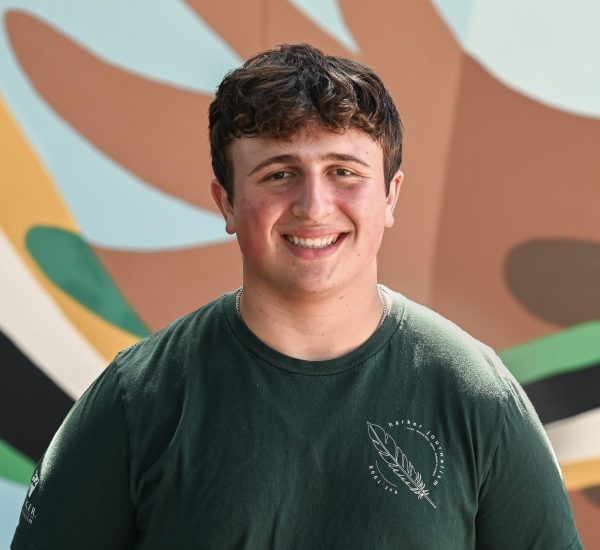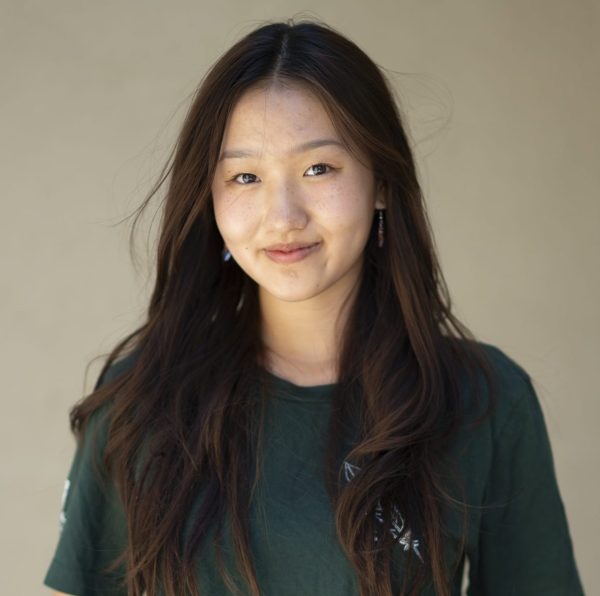Humans of Harker: Chasing something new
Shahzeb Lakhani looks at the world through a problem-solving mindset
“[Tennis is a] lot like problem solving. Sometimes, it is going to be a contest of power, skill, or psychology, but figuring out how to play tennis well built a desire in me to learn how to solve problems. I’m a problem solver at heart, it’s what I love to do, it’s what I’m always chasing. I’m always going for something new,” Shahzeb Lakhani (12) said.
The thud of tennis rackets hitting against fresh tennis balls echoes through the courts at the Blackford campus as Shahzeb Lakhani (12) rallies with a teammate during practice for the Harker tennis team. Moving to his left and reaching out with his quick forehand, Shahzeb ends the rally, and he walks back to his initial position, ready to continue the drill.
From a young age, Shahzeb learned the importance of problem solving, especially through his earliest experiences playing tennis. After convincing his parents to let him attend various camps and pay for lessons, and working on his game alone, he found that he had to apply this valuable skill to certain aspects of how he played the game.
“[Tennis is a] lot like problem solving,” Shahzeb said. “Sometimes, it is going to be a contest of power, skill, or psychology, but I think figuring out how to play tennis well built a desire in me to learn how to solve problems.”
This desire carried over into his eighth grade year at Harker, when he joined Future Problem Solvers (FPS), a club that spans the upper, middle and lower school campuses. FPS’s purpose is to teach students how to effectively apply critical thinking skills to solve problems through world-renowned methodology.
“What I love about FPS [is] its interdisciplinary nature,” Shahzeb said. “You don’t find just all technological solutions or technological challenges, you find some combinations or mix between all of them.”
After starting off at the club uninvested and only coming for the weekly Oreos, Shahzeb grew to love the club. He even made internationals, a competition for the top FPS teams from around the world, in eighth grade, participating on a team alongside longtime friend Rohan Thakur (12). Now, the two of them are the co-presidents of the club.
“As the co-presidents of the club, we run the events together and we communicate with the students together,” Rohan said. “The big thing is we’ve been able to grow together through this club. We both started in the eighth grade and since then we’ve always been on the same FPS team together, and we’ve always been working together to help mentor younger students in FPS.”
Shahzeb eventually expanded his problem-solving exploits from beyond FPS to a number of different ventures, from social media platform Veke, where he works as the vice president of engineering, to a project aligned with a multitude of different organizations working to increase fire relief funding and give homeowners more benefits. Yet, the opportunity that was most eye-opening for him came when he was an intern at a company called Guavus.
Guavus is a company that uses data models, often referred to as Big Data, as well as artificial intelligence to create solutions for operational and business challenges experienced by companies that affect profitability and customer experience.
Initially, Shahzeb’s job at Guavus was scraping data and building an AI chatbot. One day, the lead of the team he was on came up to him and asked what the purpose of Shahzeb’s work was, to which Shahzeb explained to him the specifics of his job. However, the lead responded with a different point of view to what Shahzeb expected.
“He explained to me that beyond every technological challenge, there’s some business or economic challenge that is being solved,” Shahzeb said. “And by creating a chatbot that would save resources, we would save the company millions of dollars. That was the problem that was being solved, and it helped frame the technological solutions.”
Shahzeb took this idea of interdisciplinary projects and aspirations back to Harker with him, seamlessly combining different subjects through a variety of courses offered at Harker. With that came a love for learning almost unmatched among his peers, according to business and entrepreneurship teacher Sam Lepler.
“[Shahzeb] has insightful thoughts a lot, and he likes to share them,” Lepler said. “He’s got a lot to add to a classroom, he’s got a lot of interesting perspectives, and I got to see that throughout the years. I have seen him develop into a student who is absolutely fascinated by the world and wants to know more always. He’s the kind of student who really makes teaching fun.”
Applying his love of learning to many different classes at Harker has been easy for Shahzeb, who wants to study a variety of subjects going forward and combine disparate subjects from various avenues of the intellectual world to solve problems.
“Getting strength in humanities and coupling that with STEM knowledge is going to be extremely powerful,” Shahzeb said. “Humanities helps you learn how to think, and STEM teaches you how to apply.”
Shahzeb hasn’t just grown as a student; throughout high school, he’s also developed as a person. Dawson Chen (12), who met Shahzeb on the sixth grade tennis team, offered some insight into this personal growth.
“[Shahzeb has] grown his sense of humor,” Dawson said. “He’s always been a funny guy, but he’s developed a variety in his humor. For example, this year he’s auditioning for Hoscars doing some comedy. He starts singing out of nowhere, and he practices some jokes and lines and bits. We’ve had very meaningful discussions over the years, even casually as friends.”
Whether it’s discussions with friends or interesting classes, STEM research or humanities theories, tennis courts or the classroom, it all comes back to working through problems for Shahzeb. From the time he stepped into his first FPS meeting to the present day, problem solving has defined who he is.
“I’m a problem solver at heart, it’s what I love to do, it’s what I’m always chasing,” Shahzeb said. “I’m always going for something new.”

Gabe Sachse (12) is a Managing editor for Harker Aquila, and this is his fourth year on staff. This year, Gabe is looking forward to writing his friends'...

Katelyn Zhao (12) is the co-editor-in-chief of Humans of Harker, and this is her fourth year on staff. Katelyn aims to honor each of the stories within...




![LALC Vice President of External Affairs Raeanne Li (11) explains the International Phonetic Alphabet to attendees. "We decided to have more fun topics this year instead of just talking about the same things every year so our older members can also [enjoy],” Raeanne said.](https://harkeraquila.com/wp-content/uploads/2025/10/DSC_4627-1200x795.jpg)


















![“[Building nerf blasters] became this outlet of creativity for me that hasn't been matched by anything else. The process [of] making a build complete to your desire is such a painstakingly difficult process, but I've had to learn from [the skills needed from] soldering to proper painting. There's so many different options for everything, if you think about it, it exists. The best part is [that] if it doesn't exist, you can build it yourself," Ishaan Parate said.](https://harkeraquila.com/wp-content/uploads/2022/08/DSC_8149-900x604.jpg)




![“When I came into high school, I was ready to be a follower. But DECA was a game changer for me. It helped me overcome my fear of public speaking, and it's played such a major role in who I've become today. To be able to successfully lead a chapter of 150 students, an officer team and be one of the upperclassmen I once really admired is something I'm [really] proud of,” Anvitha Tummala ('21) said.](https://harkeraquila.com/wp-content/uploads/2021/07/Screen-Shot-2021-07-25-at-9.50.05-AM-900x594.png)







![“I think getting up in the morning and having a sense of purpose [is exciting]. I think without a certain amount of drive, life is kind of obsolete and mundane, and I think having that every single day is what makes each day unique and kind of makes life exciting,” Neymika Jain (12) said.](https://harkeraquila.com/wp-content/uploads/2017/06/Screen-Shot-2017-06-03-at-4.54.16-PM.png)








![“My slogan is ‘slow feet, don’t eat, and I’m hungry.’ You need to run fast to get where you are–you aren't going to get those championships if you aren't fast,” Angel Cervantes (12) said. “I want to do well in school on my tests and in track and win championships for my team. I live by that, [and] I can do that anywhere: in the classroom or on the field.”](https://harkeraquila.com/wp-content/uploads/2018/06/DSC5146-900x601.jpg)
![“[Volleyball has] taught me how to fall correctly, and another thing it taught is that you don’t have to be the best at something to be good at it. If you just hit the ball in a smart way, then it still scores points and you’re good at it. You could be a background player and still make a much bigger impact on the team than you would think,” Anya Gert (’20) said.](https://harkeraquila.com/wp-content/uploads/2020/06/AnnaGert_JinTuan_HoHPhotoEdited-600x900.jpeg)

![“I'm not nearly there yet, but [my confidence has] definitely been getting better since I was pretty shy and timid coming into Harker my freshman year. I know that there's a lot of people that are really confident in what they do, and I really admire them. Everyone's so driven and that has really pushed me to kind of try to find my own place in high school and be more confident,” Alyssa Huang (’20) said.](https://harkeraquila.com/wp-content/uploads/2020/06/AlyssaHuang_EmilyChen_HoHPhoto-900x749.jpeg)



![“[Tennis is a] lot like problem solving. Sometimes, it is going to be a contest of power, skill, or psychology, but figuring out how to play tennis well built a desire in me to learn how to solve problems. I’m a problem solver at heart, it’s what I love to do, it’s what I’m always chasing. I’m always going for something new," Shahzeb Lakhani (12) said.](https://harkeraquila.com/wp-content/uploads/2022/04/ShahzebLakhaniHoh_KatelynZhao-e1649742702703-596x900.jpeg)